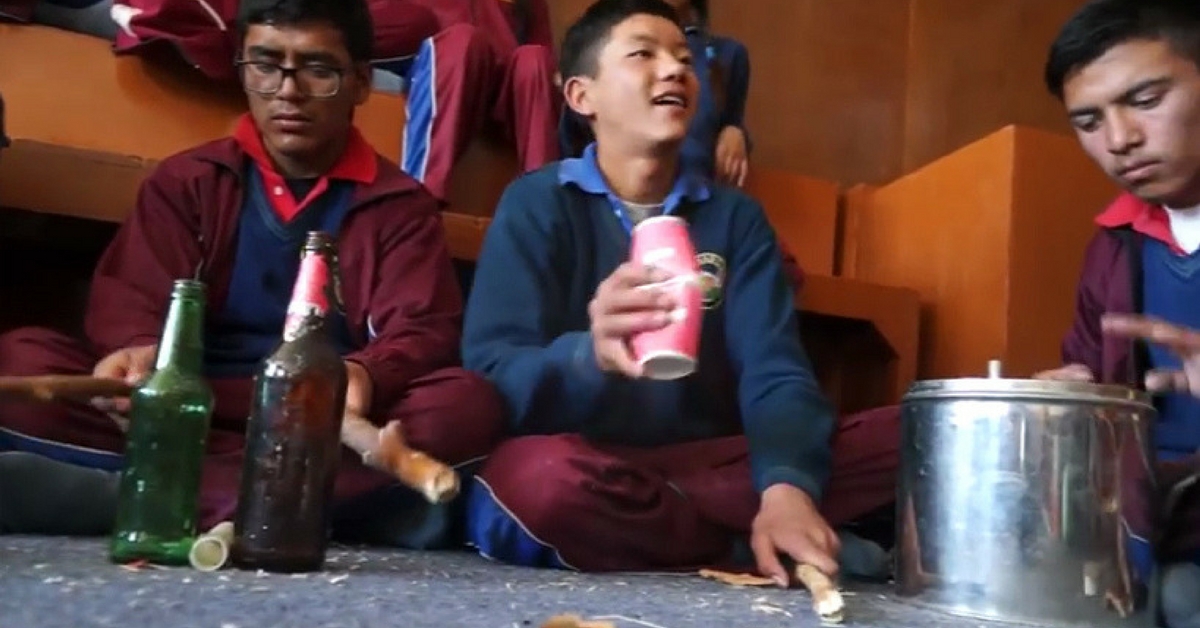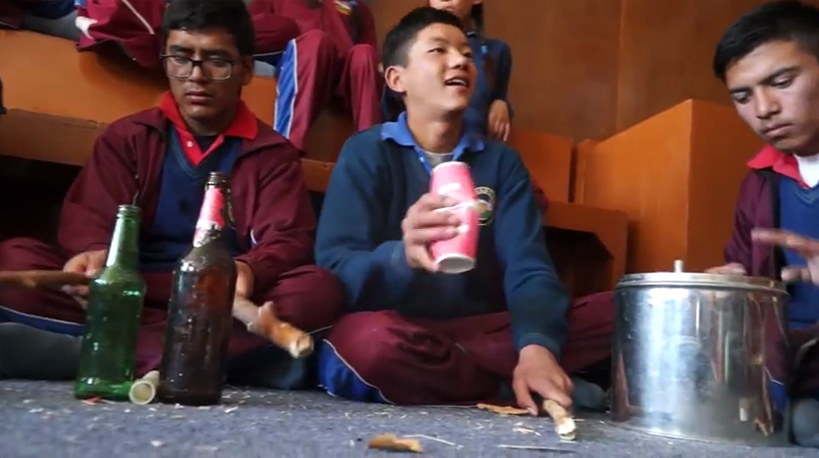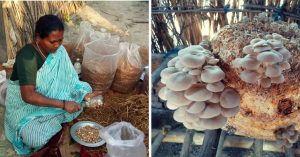TBI Blogs: These Schoolkids Taught Each Other Music by Upcycling Waste into Musical Instruments
To encourage younger students to pursue music, besides the conventional STEM subjects, students in Leh made innovative instruments out of waste to share the joy of music. The project won the Grand Prize at the ‘I CAN Awards 2015’ organised by Design for Change.

Students at Mahabodhi Residential School in Devachan, Leh, Jammu & Kashmir were concerned about many issues in their community, such as the modernization of Ladakh, which was leading to loss of culture, and littering by foreign tourists. But driven by their personal passion for music, a group of these students, who formed the school band, decided to spread their love for music with more students, and perhaps through this address some of these issues indirectly.
Class X student Mipam says, “You can’t see music, but you can hear it and feel it.” Recognising that music binds people from across castes, religions, and races, the school band wanted to spread the joy of music in the whole school and, in the process, dismiss the stereotype that students should only choose STEM subjects as career options. The students say, “Kids are always told that maths, physics, science, and chemistry are important, but for us, art, music, and environment are equally important.”
Younger students from Class III to VI would often ask the school band members, from Class VII to X, to teach them music, but the biggest problem in doing so was the lack of musical instruments for every student, as the marching band had only three bagpipes and five drums. These were not enough for a class of 30 students. This is when an idea struck them, that they could use everyday objects and waste as musical instruments so that everybody gets a chance to play.
Some younger students were initially unhappy with this idea, because they wished badly to play the shiny Snare Drum. But once they heard how nice it sounds to bang on tables and conjure up different beats and tunes like this, they bought into the fun of it. They started collecting scrap from all over the school campus to create a new musical item each day.
The project was an undertaking by Third Pole Education Base, a completely solar-powered and internet-enabled green learning space in the Himalayas founded by Paras Loomba. Ebase runs a fellowship programme, for which Aarati Rao was one of the fellows, back in 2015. She introduced the framework of Design for Change to her students. This framework, that’s been created by a not-for-profit organisation that challenges children to solve problems in their community, encourages children to first ‘feel’ for an issue, then ‘imagine’ a way out of it, then ‘do’ something about it,, and go on to ‘share’ their idea with more people.
The students first taught each other how to make different things, like shakers with Styrofoam cups, stones, sand, rice, and dals; how to use rubber bands as strings for a guitar by increasing or decreasing its pitch; and how to use tables and pens as drums and sticks in drum circles.
Kesang, one of the mentors from Class VIII says, “I was once taught music by an alumnus of this school. I remember there being only one keyboard, and all the students wanting to learn. I was lucky enough to play my hands on it. But not everyone was that lucky. This project is my way of giving back to my school.”

They organised a workshop with Sir Angchuk Ralam Ley, who is known as the “flute man of Ladakh”. He taught them how to make flutes from PVC pipes, and a traditional Jal Tarang using Chinese soup bowls filled with water. Through this, he enlightened them as to how the traditional flute is losing its value in contemporary music.

After the workshop, the students’ DFC group made a band with instruments made of waste, and called themselves the ‘MRS Trash Band’. They had the opportunity to perform at the Ladakh Festival in front of 550 people, at the Arts Hub of Leh – the Ladakh Arts and Media Organization (LAMO) – through which they shared their love for music and took pride in their local tradition.
Prior to their performance, the students spoke to the audience, comprising of foreigners and community members, about the fragile ecosystem of Ladakh, asking them not to litter and to travel sustainably.

As a result of the project, the students have cultivated a new hobby, and the campus is much cleaner as well. Whenever the school band passes by, young kids start banging on the doors and pretending to air-bang as if drumming. The students are still actively performing in Leh, and say that they plan to keep the band going and make their own compositions, centred on the theme of the environment.
Their mentor Aarati Rao says, “Design for Change has a knack for bringing the best out of students everywhere around the world. It did the same with my kids, who were blissfully unaware about their hidden talents. They say that the best way to learn is through teaching others, and that’s exactly what the kids did! Honestly, I felt like a cool kid just hanging out with the kids and learning about music.”
You can watch the beautiful story here:
The story of this Trash Band won the Grand Prize from amongst 2,512 Stories of Change submitted for the ‘I CAN Awards 2015’ organised by Design for Change. As a result of this, their school – and, by extension, the city of Leh – saw its first Robotics Lab for kids set up as a prize. The event saw a performance by Dharavi Rocks, the popular junk band comprising of children from underprivileged backgrounds from the Dharavi slum of Mumbai, whose instruments also include waste buckets, barrels, and shakers.
Other students who saw this story of Leh’s Trash Band were also inspired to replicate it in the Ebase Kodagu at Coorg, Karnataka, which runs the same fellowship model, by using metal buckets and waste buckets to create percussion instruments there. These kids are all powerfully saying that lack of resources cannot stop them from reveling in the joy of music!
Be a part of one of the largest global movements of children driving change in their communities. Take up the ‘I CAN School Challenge’ in your classroom. Find out more online, or reach out to Design For Change on +91-95999-16181.
Like this story? Or have something to share? Write to us: [email protected], or connect with us on Facebook and Twitter.
NEW: Click here to get positive news on WhatsApp!
This story made me
- 97
- 121
- 89
- 167
Tell Us More
We bring stories straight from the heart of India, to inspire millions and create a wave of impact. Our positive movement is growing bigger everyday, and we would love for you to join it.
Please contribute whatever you can, every little penny helps our team in bringing you more stories that support dreams and spread hope.



















